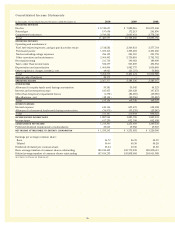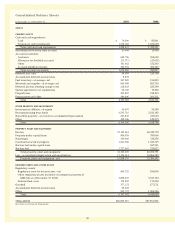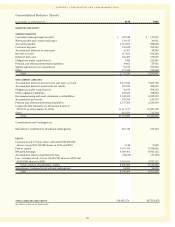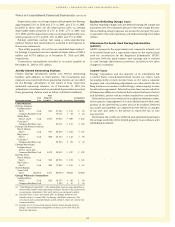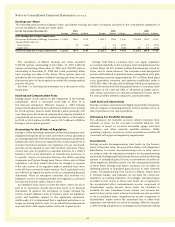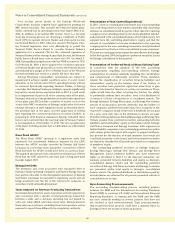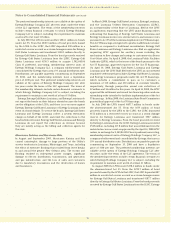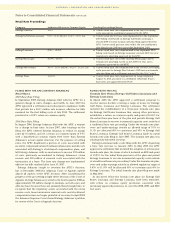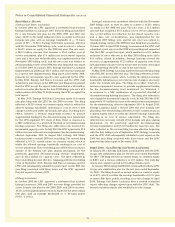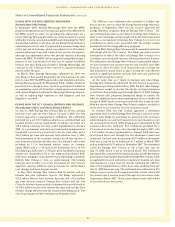Entergy 2010 Annual Report Download - page 68
Download and view the complete annual report
Please find page 68 of the 2010 Entergy annual report below. You can navigate through the pages in the report by either clicking on the pages listed below, or by using the keyword search tool below to find specific information within the annual report.
Notes to Consolidated Financial Statements continued
Four nuclear power plants in the Entergy Wholesale
Commodities business segment have applications pending for
NRC license renewals. This includes the Vermont Yankee plant,
which currently has an operating license that expires March 21,
2012. In addition to its federal NRC license, there is a two-step
state law licensing process for obtaining a Certificate of Public
Good (CPG) to operate Vermont Yankee and store spent nuclear
fuel beyond March 21, 2012, when the current CPG expires. First,
the Vermont legislature must vote affirmatively to permit the
Vermont Public Service Board to consider Vermont Yankee’s
application for a renewed CPG for the continued operation of
Vermont Yankee and for storage of spent fuel. Second, the Vermont
Public Service Board must vote to renew the CPG. On March 3,
2008, Entergy filed an application with the VPSB to renew its CPG.
On February 24, 2010, a bill to approve the continued operation
of Vermont Yankee was advanced to a vote in the Vermont Senate
and defeated by a margin of 26 to 4. Neither house of the Vermont
General Assembly has voted on a similar bill since that time.
Entergy Wholesale Commodities’ investments are subject to
impairment if adverse market conditions arise, if a unit ceases
operation, or for certain units if their operating licenses will not
be renewed. Specifically regarding Vermont Yankee, if Entergy
concludes that Vermont Yankee is unlikely to operate significantly
beyond its current license expiration date in 2012, it could result
in an impairment of part or all of the carrying value of the plant.
Entergy’s evaluation of the probability associated with operations
of the plant past 2012 include a number of factors such as the
status of the NRC’s evaluation of Entergy’s application for license
renewal, the status of state regulatory issues as described above,
the potential sale of the plant, and the application of federal
laws regarding the continued operations of nuclear facilities. In
preparing its 2010 financial statements Entergy evaluated these
factors and concluded that the carrying value of Vermont Yankee
is not impaired as of December 31, 2010. The net carrying value
of the plant, including nuclear fuel, is $424 million as of December
31, 2010.
River Bend AFUDC
The River Bend AFUDC gross-up is a regulatory asset that
represents the incremental difference imputed by the LPSC
between the AFUDC actually recorded by Entergy Gulf States
Louisiana on a net-of-tax basis during the construction of River
Bend and what the AFUDC would have been on a pre-tax basis.
The imputed amount was only calculated on that portion of River
Bend that the LPSC allowed in rate base and is being amortized
through August 2025.
Reacquired Debt
The premiums and costs associated with reacquired debt of
Entergy’s Utility operating companies and System Energy (except
that portion allocable to the deregulated operations of Entergy
Gulf States Louisiana) are included in regulatory assets and are
being amortized over the life of the related new issuances, in
accordance with ratemaking treatment.
Taxes Imposed on Revenue-Producing Transactions
Governmental authorities assess taxes that are both imposed on
and concurrent with a specific revenue-producing transaction
between a seller and a customer, including, but not limited to,
sales, use, value added, and some excise taxes. Entergy presents
these taxes on a net basis, excluding them from revenues, unless
required to report them differently by a regulatory authority.
Presentation of Non-Controlling Interests
In 2007, a new accounting pronouncement was issued regarding
non-controlling interests that requires generally that ownership
interests in subsidiaries held by parties other than the reporting
company (non-controlling interests) be clearly identified, labeled,
and presented in the consolidated balance sheet within equity, but
separate from the controlling shareholders’ equity, and that the
amount of consolidated net income attributable to the reporting
company and to the non-controlling interests be clearly identified
and presented on the face of the consolidated income statement.
This new accounting pronouncement became effective for Entergy
in the first quarter 2009 and applies to preferred securities issued
by Entergy subsidiaries to third parties.
Presentation of Preferred Stock without Sinking Fund
In connection with the adoption of the new accounting
pronouncement regarding non-controlling interests Entergy
evaluated the accounting standards regarding the classification
and measurement of redeemable securities. These standards
require the classification of securities between liabilities and
shareholders’ equity on the balance sheet if the holders of
those securities have protective rights that allow them to gain
control of the board of directors in certain circumstances. These
rights would have the effect of giving the holders the ability
to potentially redeem their securities, even if the likelihood of
occurrence of these circumstances is considered remote. The
Entergy Arkansas, Entergy Mississippi, and Entergy New Orleans
articles of incorporation provide, generally, that the holders of
each company’s preferred securities may elect a majority of the
respective company’s board of directors if dividends are not paid
for a year, until such time as the dividends in arrears are paid.
Therefore, Entergy Arkansas, Entergy Mississippi, and Entergy New
Orleans present their preferred securities outstanding between
liabilities and shareholders’ equity on the balance sheet. Entergy
Gulf States Louisiana and Entergy Louisiana, both organized as
limited liability companies, have outstanding preferred securities
with similar protective rights with respect to unpaid dividends,
but provide for the election of board members that would not
constitute a majority of the board; and their preferred securities
are therefore classified for all periods presented as a component
of members’ equity.
The outstanding preferred securities of Entergy Arkansas,
Entergy Mississippi, Entergy New Orleans, and Entergy Asset
Management, whose preferred holders also have protective
rights as described in Note 6 to the financial statements, are
similarly presented between liabilities and equity on Entergy’s
consolidated balance sheets and the outstanding preferred
securities of Entergy Gulf States Louisiana and Entergy Louisiana
are presented within total equity in Entergy’s consolidated
balance sheets. The preferred dividends or distributions paid by
all subsidiaries are reflected for all periods presented outside of
consolidated net income.
New Accounting Pronouncements
The accounting standard-setting process, including projects
between the FASB and the International Accounting Standards
Board (IASB) to converge U.S. GAAP and International Financial
Reporting Standards, is ongoing and the FASB and the IASB
are each currently working on several projects that have not
yet resulted in final pronouncements. Final pronouncements
that result from these projects could have a material effect on
Entergy’s future net income or financial position.
66


